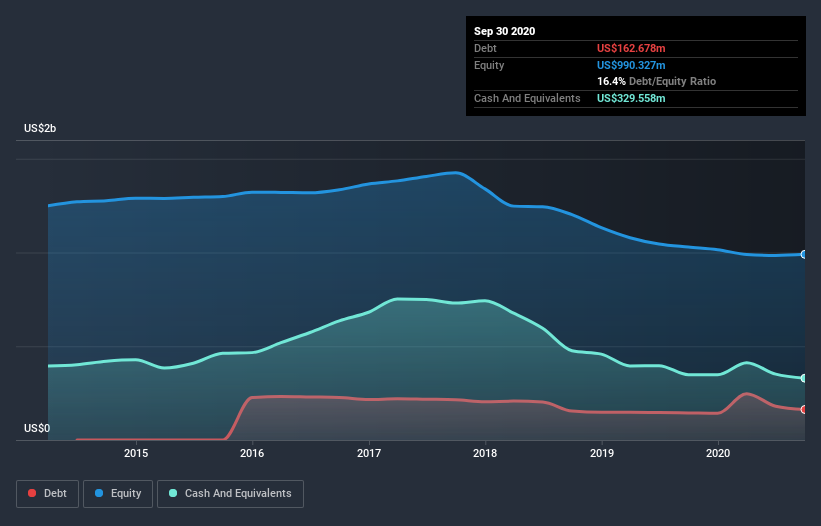Benchmark Electronics (NYSE:BHE) Has A Pretty Healthy Balance Sheet
Howard Marks put it nicely when he said that, rather than worrying about share price volatility, 'The possibility of permanent loss is the risk I worry about... and every practical investor I know worries about.' It's only natural to consider a company's balance sheet when you examine how risky it is, since debt is often involved when a business collapses. We note that Benchmark Electronics, Inc. (NYSE:BHE) does have debt on its balance sheet. But is this debt a concern to shareholders?
When Is Debt A Problem?
Debt is a tool to help businesses grow, but if a business is incapable of paying off its lenders, then it exists at their mercy. If things get really bad, the lenders can take control of the business. However, a more frequent (but still costly) occurrence is where a company must issue shares at bargain-basement prices, permanently diluting shareholders, just to shore up its balance sheet. Of course, plenty of companies use debt to fund growth, without any negative consequences. The first step when considering a company's debt levels is to consider its cash and debt together.
View our latest analysis for Benchmark Electronics
What Is Benchmark Electronics's Net Debt?
As you can see below, at the end of September 2020, Benchmark Electronics had US$162.7m of debt, up from US$144.5m a year ago. Click the image for more detail. But on the other hand it also has US$329.6m in cash, leading to a US$166.9m net cash position.
How Healthy Is Benchmark Electronics' Balance Sheet?
According to the last reported balance sheet, Benchmark Electronics had liabilities of US$449.5m due within 12 months, and liabilities of US$294.7m due beyond 12 months. Offsetting this, it had US$329.6m in cash and US$468.3m in receivables that were due within 12 months. So it can boast US$53.7m more liquid assets than total liabilities.
This surplus suggests that Benchmark Electronics has a conservative balance sheet, and could probably eliminate its debt without much difficulty. Succinctly put, Benchmark Electronics boasts net cash, so it's fair to say it does not have a heavy debt load!
It is just as well that Benchmark Electronics's load is not too heavy, because its EBIT was down 28% over the last year. Falling earnings (if the trend continues) could eventually make even modest debt quite risky. There's no doubt that we learn most about debt from the balance sheet. But ultimately the future profitability of the business will decide if Benchmark Electronics can strengthen its balance sheet over time. So if you're focused on the future you can check out this free report showing analyst profit forecasts.
But our final consideration is also important, because a company cannot pay debt with paper profits; it needs cold hard cash. Benchmark Electronics may have net cash on the balance sheet, but it is still interesting to look at how well the business converts its earnings before interest and tax (EBIT) to free cash flow, because that will influence both its need for, and its capacity to manage debt. Over the most recent three years, Benchmark Electronics recorded free cash flow worth 57% of its EBIT, which is around normal, given free cash flow excludes interest and tax. This cold hard cash means it can reduce its debt when it wants to.
Summing up
While we empathize with investors who find debt concerning, you should keep in mind that Benchmark Electronics has net cash of US$166.9m, as well as more liquid assets than liabilities. So we are not troubled with Benchmark Electronics's debt use. The balance sheet is clearly the area to focus on when you are analysing debt. But ultimately, every company can contain risks that exist outside of the balance sheet. Be aware that Benchmark Electronics is showing 2 warning signs in our investment analysis , you should know about...
At the end of the day, it's often better to focus on companies that are free from net debt. You can access our special list of such companies (all with a track record of profit growth). It's free.
This article by Simply Wall St is general in nature. It does not constitute a recommendation to buy or sell any stock, and does not take account of your objectives, or your financial situation. We aim to bring you long-term focused analysis driven by fundamental data. Note that our analysis may not factor in the latest price-sensitive company announcements or qualitative material. Simply Wall St has no position in any stocks mentioned.
Have feedback on this article? Concerned about the content? Get in touch with us directly. Alternatively, email editorial-team (at) simplywallst.com.

